First Letter from Tim Ferguson to Kamala Harris, November 2024
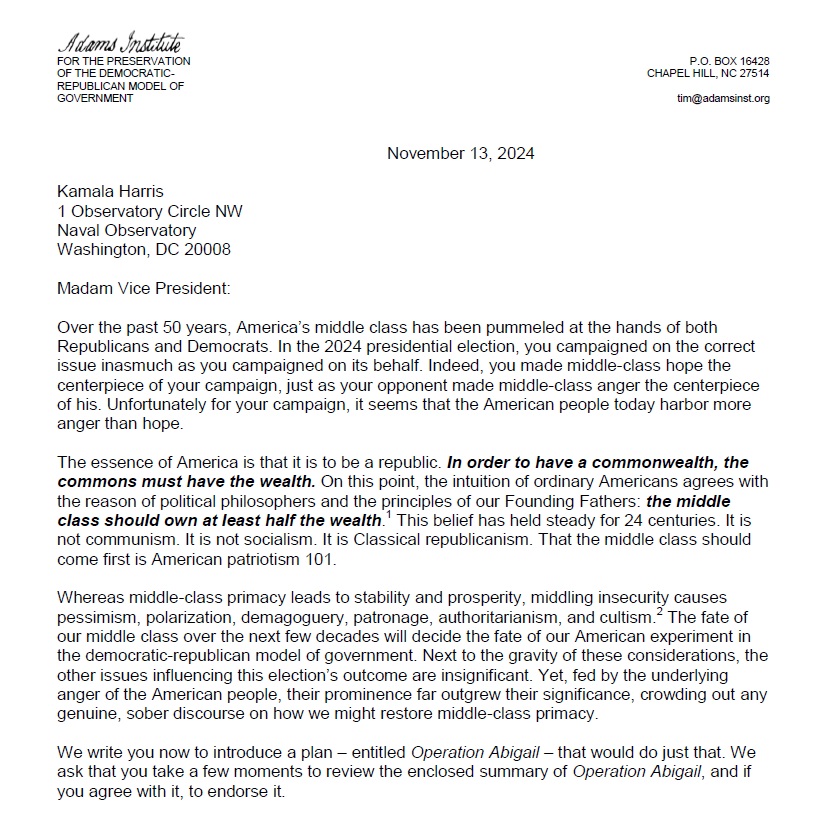
Over the past 50 years, America’s middle class has been pummeled at the hands of both Republicans and Democrats. In the 2024 presidential election, you campaigned on the correct issue inasmuch as you campaigned on its behalf. Indeed, you made middle-class hope the centerpiece of your campaign, just as your opponent made middle-class anger the centerpiece of his. Unfortunately for your campaign, it seems that the American people today harbor more anger than hope. The essence of America is that it is to be a republic. In order to have a commonwealth, the commons must have the wealth. On this point, the intuition of ordinary Americans agrees with the reason of political philosophers and the principles of our Founding Fathers: the middle class should own at least half the wealth.
First Letter from Tim Ferguson to Donald Trump, November 2024
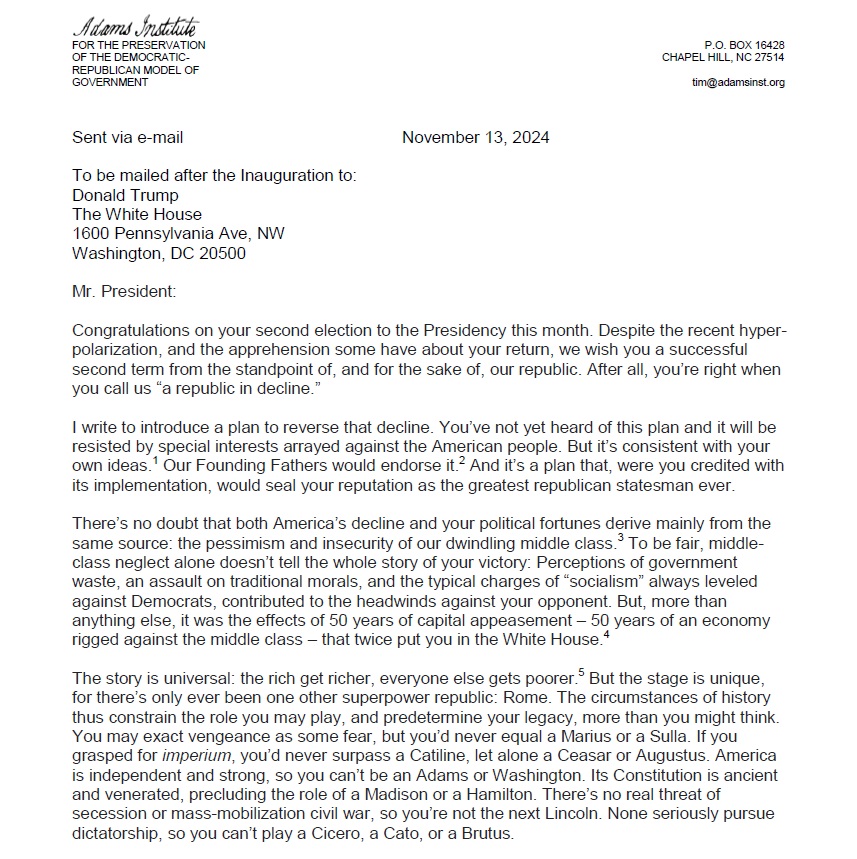
Congratulations on your second election to the Presidency this month. Despite the recent hyper-polarization, and the apprehension some have about your return, we wish you a successful second term from the standpoint of, and for the sake of, our republic. After all, you’re right when you call us “a republic in decline.” I write to introduce a plan to reverse that decline. You’ve not yet heard of this plan and it will be resisted by special interests arrayed against the American people. But it’s consistent with your own ideas. Our Founding Fathers would endorse it. And it’s a plan that, were you credited with its implementation, would seal your reputation as the greatest republican statesmen ever. There’s no doubt that both America’s decline and your political fortunes derive mainly from the same source: the pessimism and insecurity of our dwindling middle class.
First Letter from Tim Ferguson to Peter Georgescu, October 2024
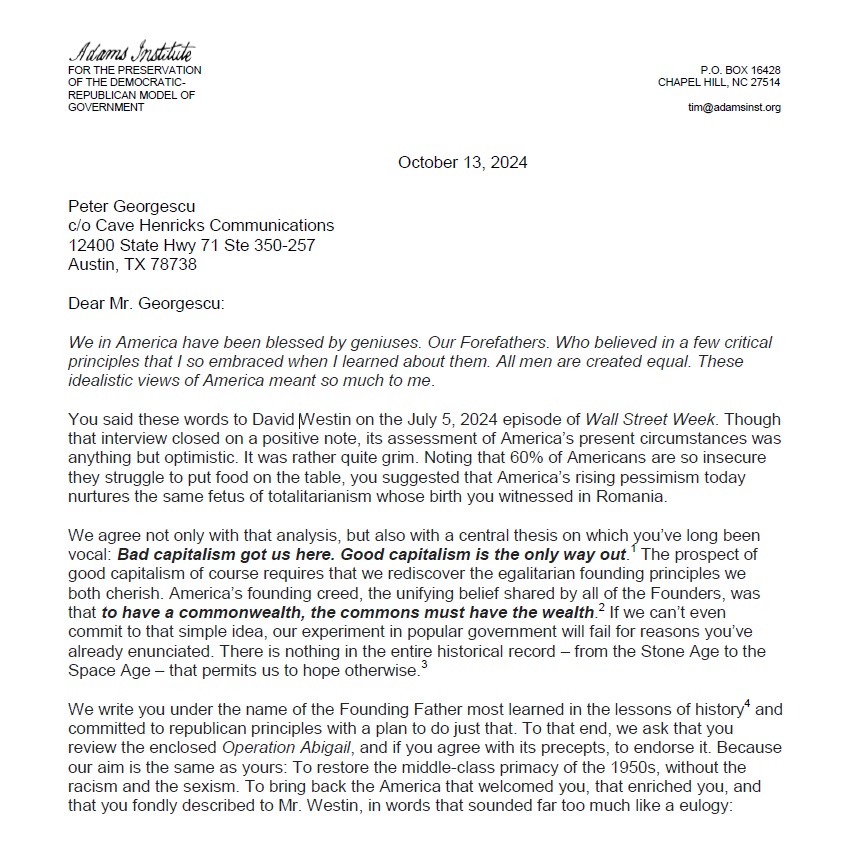
We in America have been blessed by geniuses. Our Forefathers. Who believed in a few critical principles that I so embraced when I learned about them. All men are created equal. These idealistic views of America meant so much to me. You said these words to David Westin on the July 5, 2024 episode of Wall Street Week. Though that interview closed on a positive note, its assessment of America’s present circumstances was anything but optimistic. It was rather quite grim. Noting that 60% of Americans are so insecure they struggle to put food on the table, you suggested that America’s rising pessimism today nurtures the same fetus of totalitarianism whose birth you witnessed in Romania. We agree not only with that analysis, but also with a central thesis on which you’ve long been vocal: Bad capitalism got us here. Good capitalism is the only way out.
First Letter from Tim Ferguson to Steve Ballmer, October 2024
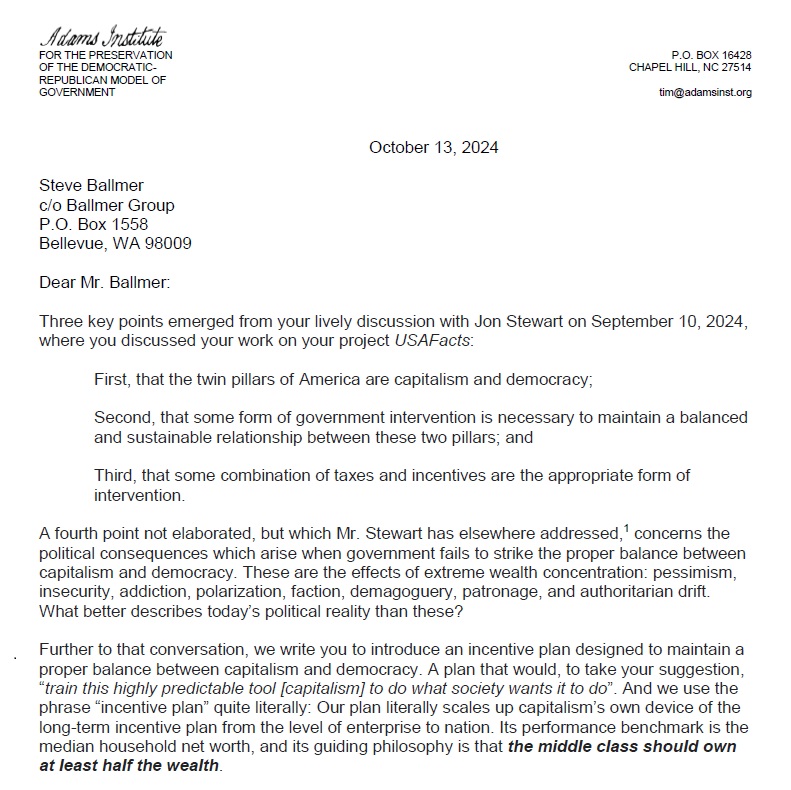
Three key points emerged from your lively discussion with Jon Stewart on September 10, 2024, where you discussed your work on your project USAFacts: First, that the twin pillars of America are capitalism and democracy; Second, that some form of government intervention is necessary to maintain a balanced and sustainable relationship between these two pillars; and Third, that some combination of taxes and incentives are the appropriate form of intervention. A fourth point not elaborated, but which Mr. Stewart has elsewhere addressed, concerns the political consequences which arise when government fails to strike the proper balance between capitalism and democracy. These are the effects of extreme wealth concentration: pessimism, insecurity, addiction, polarization, faction, demagoguery, patronage, and authoritarian drift. What better describes today’s political reality than these?
Second Letter from Tim Ferguson to Tim Wu, September 2024
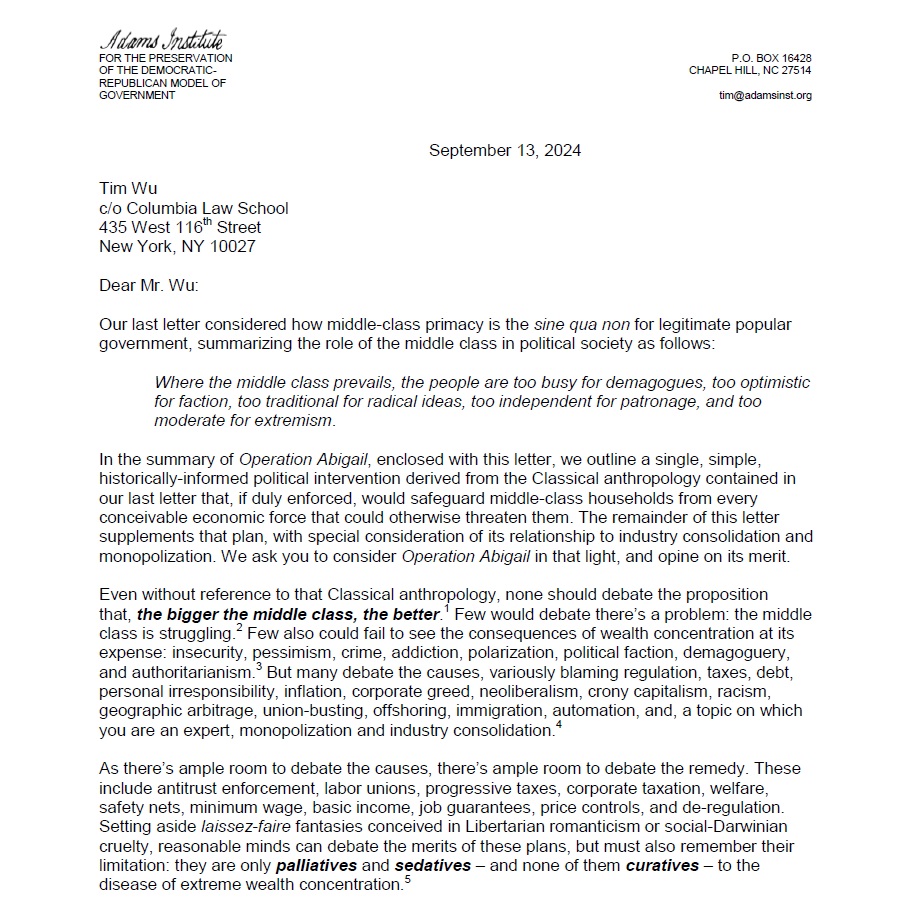
Our last letter considered how middle-class primacy is the sine qua non for legitimate popular government, summarizing the role of the middle class in political society as follows: Where the middle class prevails, the people are too busy for demagogues, too optimistic for faction, too traditional for radical ideas, too independent for patronage, and too moderate for extremism. In the summary of Operation Abigail, enclosed with this letter, we outline a single, simple, historically-informed political intervention derived from the Classical anthropology contained in our last letter that, if duly enforced, would safeguard middle-class households from every conceivable economic force that could otherwise threaten them. The remainder of this letter supplements that plan, with special consideration of its relationship to industry consolidation and monopolization. We ask you to consider Operation Abigail in that light, and opine on its merit.
First Letter from Tim Ferguson to Arnold Schwarzenegger, September 2024
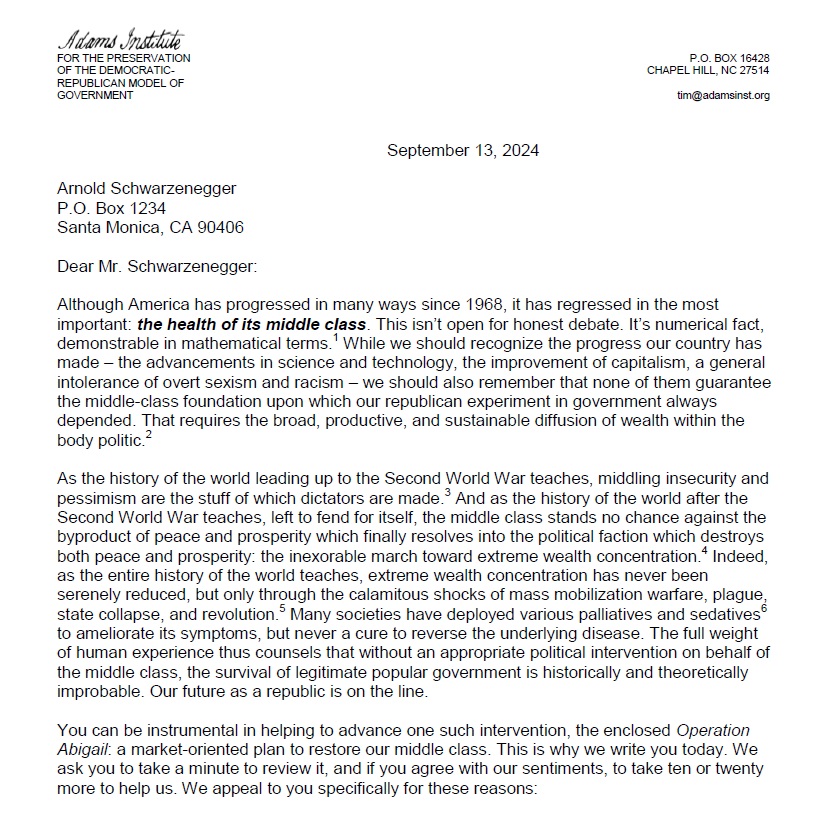
Although America has progressed in many ways since 1968, it has regressed in the most important: the health of its middle class. This isn’t open for honest debate. It’s numerical fact, demonstrable in mathematical terms. While we should recognize the progress our country has made – the advancements in science and technology, the improvement of capitalism, a general intolerance of overt sexism and racism – we should also remember that none of them guarantee the middle-class foundation upon which our republican experiment in government always depended. That requires the broad, productive, and sustainable diffusion of wealth within the body politic. As the history of the world leading up to the Second World War teaches, middling insecurity and pessimism are the stuff of which dictators are made. And as the history of the world after the Second World War teaches, left to fend for itself, the middle class stands no chance against the byproduct of peace and prosperity which finally resolves into the political faction which destroys both peace and prosperity: the inexorable march toward extreme wealth concentration.
First Letter from Tim Ferguson to Joe Biden, August 2024
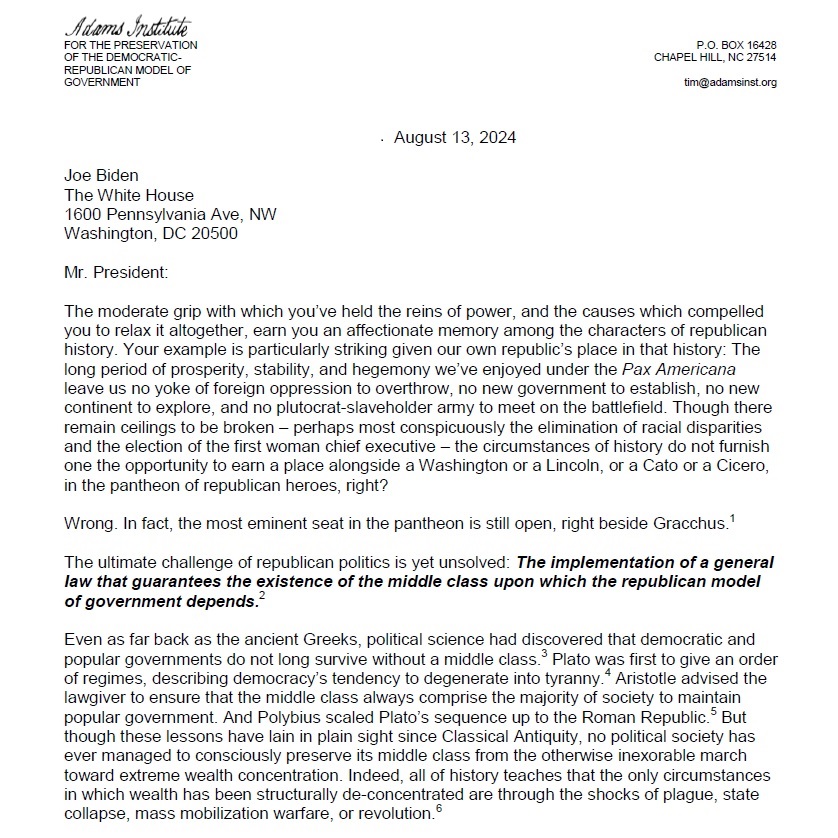
The moderate grip with which you’ve held the reins of power, and the causes which compelled you to relax it altogether, earn you an affectionate memory among the characters of republican history. Your example is particularly striking given our own republic’s place in that history: The long period of prosperity, stability, and hegemony we’ve enjoyed under the Pax Americana leave us no yoke of foreign oppression to overthrow, no new government to establish, no new continent to explore, and no plutocrat-slaveholder army to meet on the battlefield. Though there remain ceilings to be broken – perhaps most conspicuously the elimination of racial disparities and the election of the first woman chief executive – the circumstances of history do not furnish one the opportunity to earn a place alongside a Washington or a Lincoln, or a Cato or a Cicero, in the pantheon of republican heroes, right?
First Letter from Tim Ferguson to Steve Bannon, August 2024
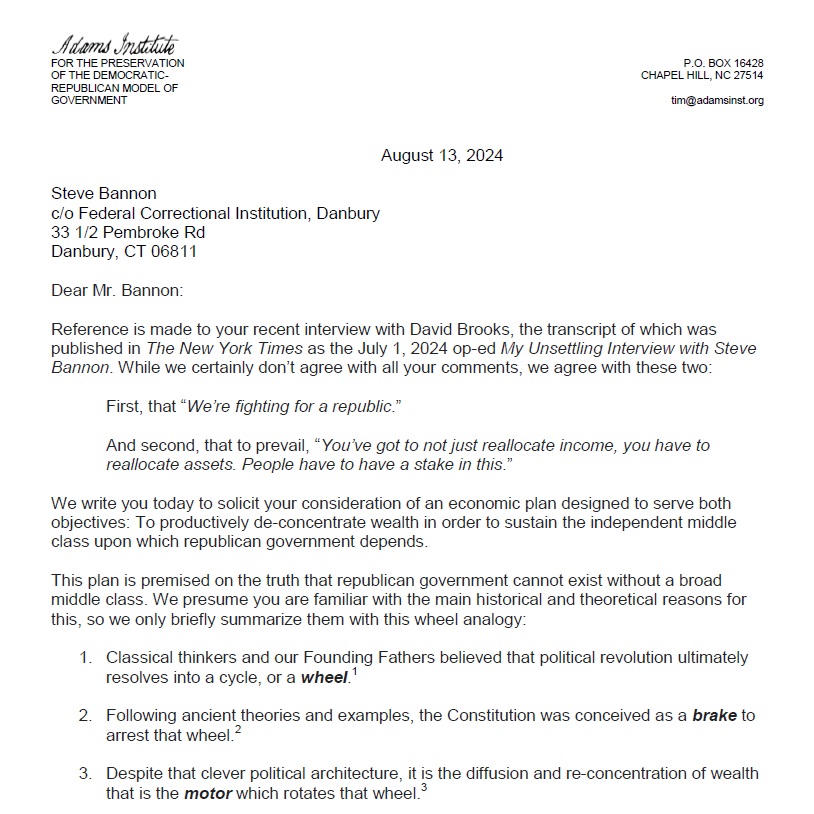
Reference is made to your recent interview with David Brooks, the transcript of which was published in The New York Times as the July 1, 2024 op-ed My Unsettling Interview with Steve Bannon. While we certainly don’t agree with all your comments, we agree with these two: First, that “We’re fighting for a republic.” And second, that to prevail, “You’ve got to not just reallocate income, you have to reallocate assets. People have to have a stake in this.” We write you today to solicit your consideration of an economic plan designed to serve both objectives: To productively de-concentrate wealth in order to sustain the independent middle class upon which republican government depends.
First Letter from Tim Ferguson to Ganesh Sitaraman, July 2024
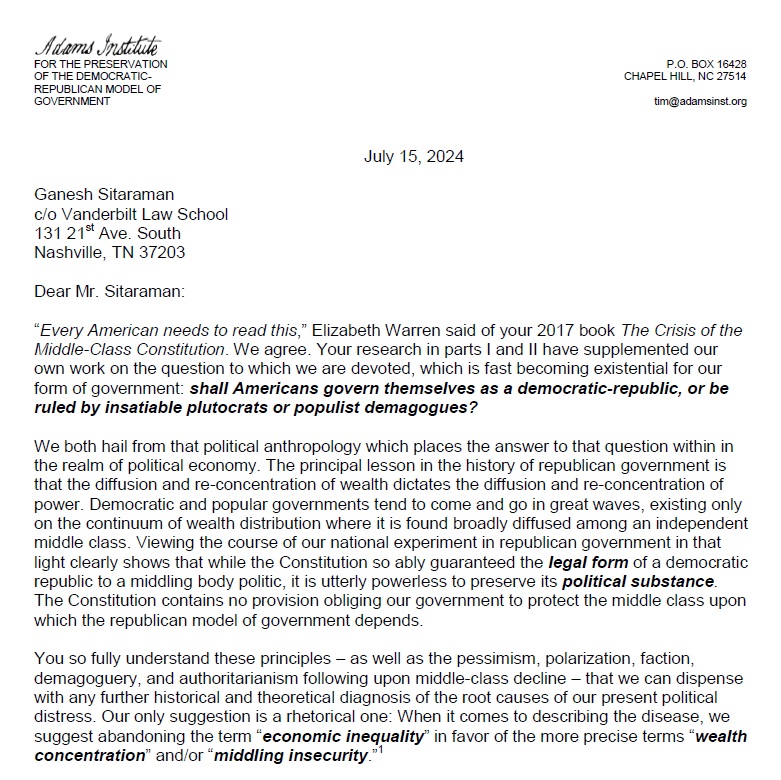
“Every American needs to read this,” Elizabeth Warren said of your 2017 book The Crisis of the Middle-Class Constitution. We agree. Your research in parts I and II have supplemented our own work on the question to which we are devoted, which is fast becoming existential for our form of government: shall Americans govern themselves as a democratic-republic, or be ruled by insatiable plutocrats or populist demagogues? We both hail from that political anthropology which places the answer to that question within in the realm of political economy. The principal lesson in the history of republican government is that the diffusion and re-concentration of wealth dictates the diffusion and re-concentration of power. Democratic and popular governments tend to come and go in great waves, existing only on the continuum of wealth distribution where it is found broadly diffused among an independent middle class.
Second Letter from Tim Ferguson to Jon Stewart, July 2024
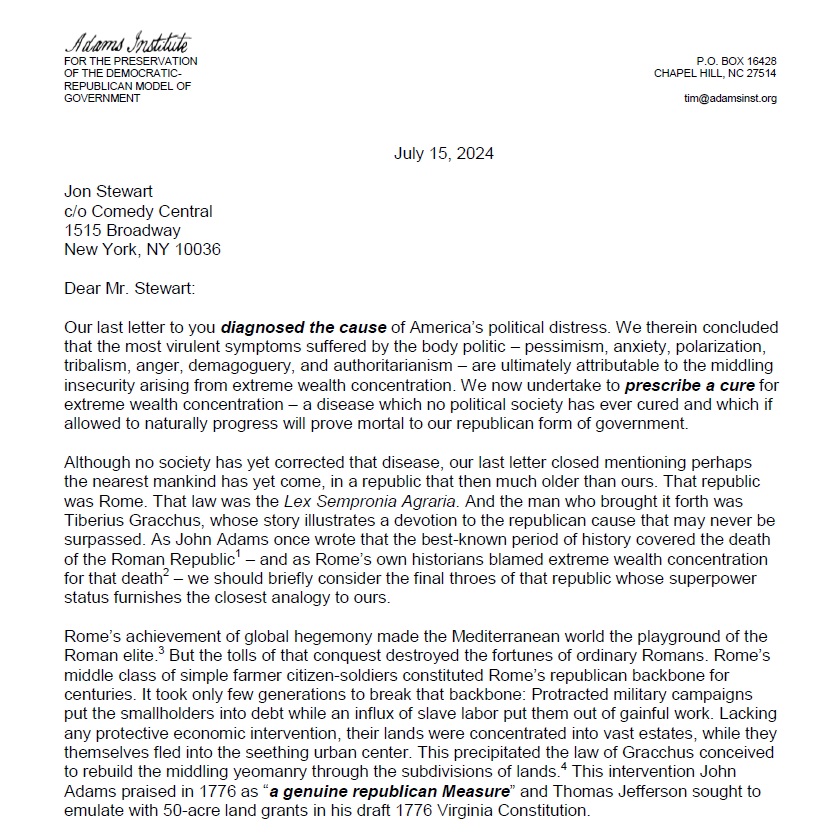
Our last letter to you diagnosed the cause of America’s political distress. We therein concluded that the most virulent symptoms suffered by the body politic – pessimism, anxiety, polarization, tribalism, anger, demagoguery, and authoritarianism – are ultimately attributable to the middling insecurity arising from extreme wealth concentration. We now undertake to prescribe a cure for extreme wealth concentration – a disease which no political society has ever cured and which if allowed to naturally progress will prove mortal to our republican form of government. Although no society has yet corrected that disease, our last letter closed mentioning perhaps the nearest mankind has yet come, in a republic that then much older than ours. That republic was Rome. That law was the Lex Sempronia Agraria. And the man who brought it forth was Tiberius Gracchus, whose story illustrates a devotion to the republican cause that may never be surpassed.
